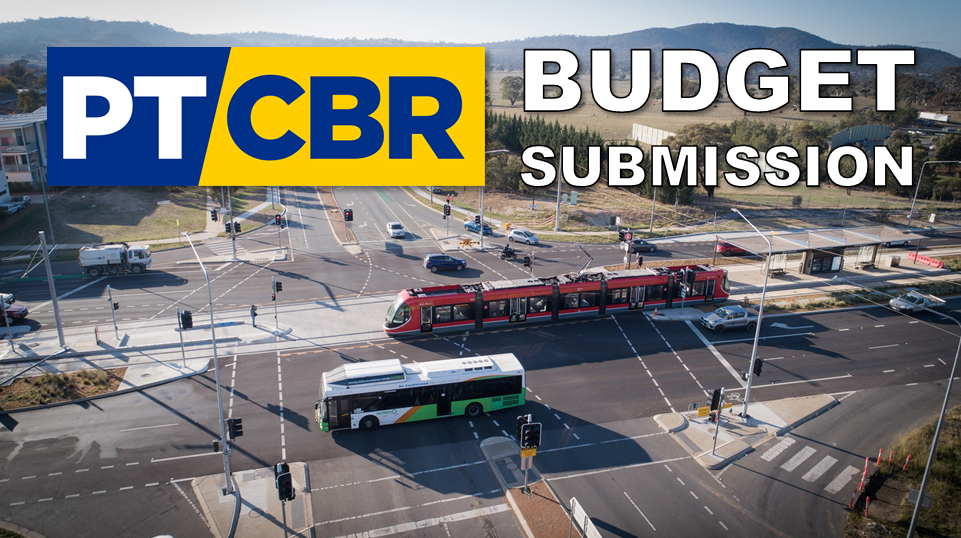
Each year, the ACT Government invites community groups and the wider public to make recommendations on how funding should be allocated as part of the following year’s budget. This presents an excellent opportunity for PTCBR to let the Government know what sort of improvements would benefit the current and future users of Canberra’s public transport system.
The PTCBR Executive Committee have spent the past few weeks preparing our submission, which can be viewed in full below:
View PTCBR’s 2020-21 Budget Submission here.
PTCBR strongly supports the ACT Government’s focus on delivery. Where once the public was fed nebulous planning terms and vague promises of better inter-town public transport at some undetermined point in the future, now they have actual funding commitments and the delivery of real, concrete infrastructure in the form of light rail, that Canberrans can use right here, right now.
In this year’s submission, PTCBR has reiterated its support for ongoing improvements to the passenger experience and strategic transport planning for the future. In the context of the ACT Government’s recently-released Climate Change Strategy 2019-25, the submission recommends that sufficient funding be allocated to meet the recommended 40-45 per cent mode shift away from private car usage by 2045.
A summary of PTCBR’s recommendations is provide below. As with our previous submissions, the PTCBR Executive Committee will be lobbying our elected representatives and speaking to Transport Canberra and other ACT Government agencies to implement as many of these recommendations as possible.
PTCBR’s recommendations for ACT Government transport spending:
- reinstate the pre-September 2019 weekend bus frequencies;
- drive sustainable workplace cultural reform to ensure the reliable and cost-effective provision of bus services in the ACT;
- conduct a benchmarking exercise;
- extend the peak hour frequency for weekday local bus services to align with peak hour arrangements for light rail;
- standardise amenity at all bus stops, including the provision of seating;
- expand park and ride facilities;
- introduce new ticketing technology;
- incorporate wire-free technology into Canberra’s existing light rail vehicles;
- update the Light Rail Network Plan;
- improve cross-border public transport;
- introduce a moratorium on new parkway-standard roads;
- replace registration fees with distance-based charges;
- continue to roll out light rail;
- establish a skills base for future light rail construction;
- plan for a new heavy rail station that is integrated into the ACT’s public transport network;
- rebalance the ACT transport budget;
- meet the urban design requirements of the National Capital Authority;
- improve the customer experience at interchanges;
- improve Canberra’s active travel infrastructure;
- improve public transport at the district level;
- reduce the minimum parking requirements for a demonstration housing precinct;
- locate local and rapid bus stops closer together;
- develop a Transport Canberra app;
- expand the on-demand and flexible bus services;
- improve Transport Canberra’s use of data and analytics;
- investigate free fare zones;
- examine free weekend travel for young people;
- construct additional bus stops on arterial roads;
- improve public transport and active travel infrastructure in and around Canberra Hospital as part of the SPIRE project;
- investigate additional orbital bus routes;
- introduce a passenger counter barometer; and
- establish predictable funding arrangements for fleet procurement.
PTCBR makes no apology for our focus on getting good outcomes for people who catch public transport in the ACT and surrounding region, whether it be by choice, or because they have no other transport option.
As a former Prime Minister once said of Canberra – “You can never spend too much on the public”. Nowhere does that statement hold truer than in investment in providing fast, frequent and reliable transport options for all citizens of this great city of ours.
To stay up to date with all public transport and planning issues in Canberra, join the PTCBR here and visit our Facebook group.